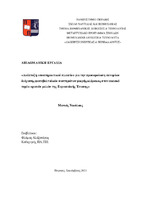Ανάπτυξη υποστηρικτικού πλαισίου για την προσομοίωση σεναρίων διάχυσης φωτοβολταϊκών συστημάτων μικρής κλίμακας στον οικιακό τομέα κρατών μελών της Ευρωπαϊκής Ένωσης
Developing a supportive framework to simulate diffusion scenarios of small-scale solar photovoltaic systems in European Union member states’ residential sector

Προβολή/
Λέξεις κλειδιά
Ενεργειακή μετάβαση ; Ανανεώσιμες πηγές ενέργειας ; Φωτοβολταϊκά συστήματα μικρής κλίμακας ; Μοντελοποίηση ; Προσομοίωση ενεργειακών συστημάτων ; Ποσοτικοποίηση αβεβαιοτήτων ; Ηλιακό δυναμικό ; Ανάλυση ευαισθησίας ; Υιοθέτηση τεχνολογιών ; Μοντελοποίηση βάσει πρακτόρων ; Προσομοίωση πιθανών εξελίξεων ; Ενεργειακή πολιτική ; Κλιματική πολιτικήΠερίληψη
Λαμβάνοντας υπόψιν τους κλιματικούς και ενεργειακούς στόχους που έχουν τεθεί από την Ευρωπαϊκή Ένωση, και τη μετάβαση στην κλιματική ουδετερότητα έως το 2050, η ανάγκη για διάχυση τεχνολογιών παραγωγής ηλεκτρικής ενέργειας από ανανεώσιμες πηγές καθίσταται όλο και πιο επιτακτική.
Βασικός στόχος της παρούσας μεταπτυχιακής διπλωματικής εργασίας είναι να ερευνήσει το πως οι κάτοικοι συγκεκριμένων κρατών μελών της Ευρωπαϊκής Ένωσης (δηλ. Γαλλία, Δανία, Ελλάδα, Ισπανία, Πορτογαλία, και Πολωνία) μπορούν να έχουν έναν μεγαλύτερο ρόλο στο μελλοντικό ενεργειακό σύστημα και να επιδράσουν στη διάχυση των φωτοβολταϊκών συστημάτων μικρής κλίμακας, με τον κατάλληλο σχεδιασμό ενεργειακής πολιτικής. Ωστόσο, η γνώση γύρω από το πως διάφοροι κοινωνικοπολιτικοί παράγοντες επηρεάζουν τη διαδικασία λήψης αποφάσεων των κατοίκων, βρίσκεται ακόμη σε πρώιμο στάδιο.
Διευρύνοντας την υπάρχουσα γνώση στην επιστημονική βιβλιογραφία, η παρούσα εργασία στοχεύει στο να εξετάσει τη δυναμική διάχυσης φωτοβολταϊκών συστημάτων μικρής κλίμακας (στέγης) στον οικιακό τομέα των προαναφερθέντων κρατών μελών της Ευρωπαϊκής Ένωσης μέσω της χρήσης του υπολογιστικού εργαλείου μοντελοποίησης και προσομοίωσης βάσει πρακτόρων “ATOM”, το οποίο αναπτύχθηκε από το Εργαστήριο Τεχνοοικονομικής Ενεργειακών Συστημάτων (“Technoeconomics of Energy Systems laboratory - TEESlab”).
Πιο συγκεκριμένα, η μελέτη της πιθανής εξέλιξης διαφορετικών σεναρίων διάχυσης φωτοβολταϊκών συστημάτων μικρής κλίμακας πραγματοποιήθηκε υπό διαφορετικά σχήματα ενεργειακής πολιτικής, όπως είναι ο «ενεργειακός συμψηφισμός» (“net metering”) ή ο «συμψηφισμός λογαριασμού» (“net billing”) και υπό τρία (3) διαφορετικά κοινωνικοοικονομικά μονοπάτια μετάβασης (“socioeconomic storylines/transition pathways”) για κάθε σχήμα. Επισημαίνεται ότι η εξαγωγή προβλέψεων πιθανής εξέλιξης της διάχυσης φωτοβολταϊκών συστημάτων στον οικιακό τομέα, εκτελείται μόνο για την Ελλάδα, ωστόσο η ανάπτυξη του υποστηρικτικού πλαισίου για εφαρμογή του υπολογιστικού εργαλείου “ATOM” και στα προαναφερθέντα Κράτη Μέλη, πραγματοποιείται κανονικά στα πλαίσια της παρούσας εργασίας. Επισημαίνεται πως η βαθμονόμηση του εργαλείου “ATOM” δεν εφαρμόζεται για την περίπτωση της Πολωνίας, λόγω έλλειψης διαθέσιμων δεδομένων.
Τα αποτελέσματα της εργασίας καταδεικνύουν ότι η συμπεριφορά των «πρακτόρων» διαφοροποιείται από χώρα σε χώρα με γνώμονα τα διαφορετικά τεχνοοικονομικά δεδομένα που χαρακτηρίζουν την κάθε χώρα. Τέλος, τα αποτελέσματα της παρούσας εργασίας καταδεικνύουν (ποσοτικά) ότι ο συνδυασμός διαφορετικών σχημάτων ενεργειακής πολιτικής μπορεί να είναι απαραίτητος για την προαγωγή και υποστήριξη της αυτοπαραγωγής και ιδιοκατανάλωσης στην Ελλάδα. Το ακριβές μονοπάτι που οδηγεί στην επίτευξη των ενεργειακών στόχων ποικίλει από χώρα σε χώρα, ενώ η συγκεκριμένη εργασία παρουσιάζει προτάσεις που αφορούν τη χάραξη πολιτικών για την περίπτωση μελέτης της Ελλάδας.

